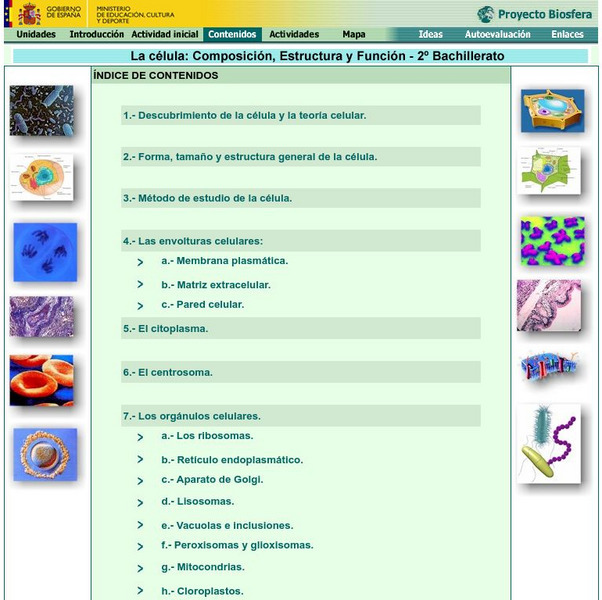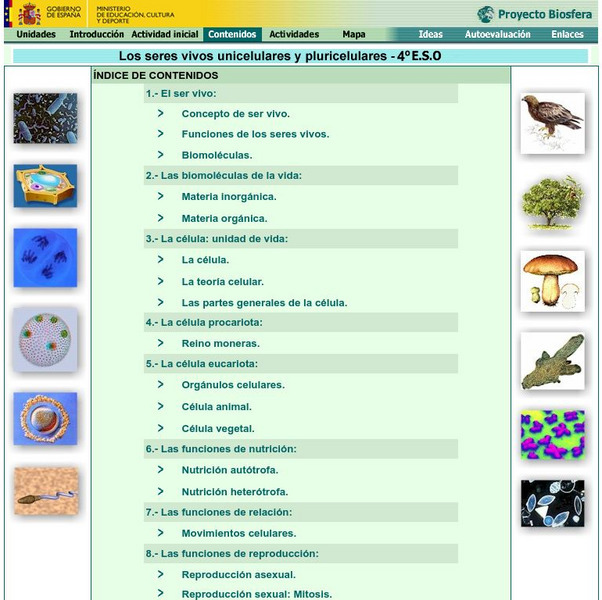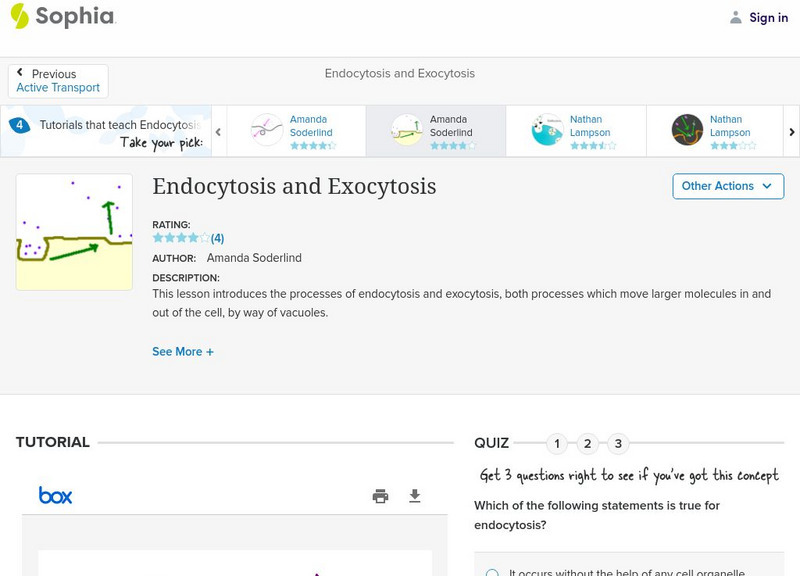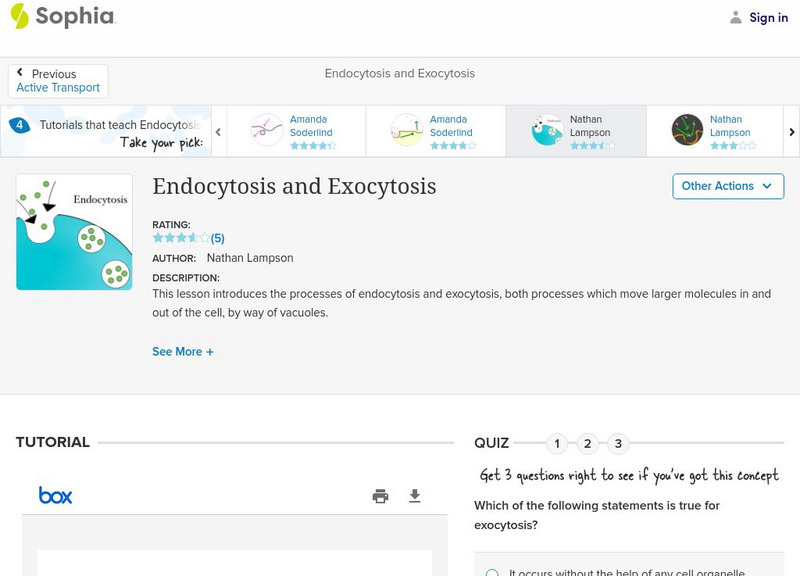Science Education Resource Center at Carleton College
Serc: Observe, Describe, Compare and Contrast Cells
This investigation allows students to observe cells from multiple sources. Plant, animal and bacterial cells will be observed as well as cells from multicellular organisms and single-celled organisms. After providing written descriptions...
ArtsNow
Arts Now Learning: Dancing Cells [Pdf]
This activity will challenge students to create dances to represent the different parts of a cell.
TeachEngineering
Teach Engineering: Cell Membrane Color Sheet and Build a Cell Membrane
Students color-code a schematic of a cell and its cell membrane structures. Then they complete the "Build-a-Membrane" activity found at http://learn.genetics.utah.edu. This reinforces their understanding of the structure and function of...
Khan Academy
Khan Academy: Passive Transport & Active Transport Across Cell Membrane Article
The cell membrane is one of the great multi-taskers of biology. It provides structure for the cell, protects cytosolic contents from the environment, and allows cells to act as specialized units. Learn how the membrane functions to...
Alabama Learning Exchange
Alex: Those Cells Look Good Enough to Eat.
This is a student led activity utilizing visualization and association to memorize the parts of animal and plant cells. Students will work cooperatively to develop drawings to connect the parts of cells to one of their favorite things:...
My Science Site
Life Systems: Cells, Tissues, Organs
Extensive site for teachers provides some helpful resources that pertain to plant and animal cells. Includes a microscope diagram as well as plant, animal and pond labs. Also contains links to structures and mechanisms, matter and...
National Health Museum
Access Excellence: Travel Brochure for a Cell
This activity offers an alternative to cell models to help the students to understand cells and their functions. Students are required to produce a travel brochure that describes a plant or animal cell as if it were a large exhibit or...
National Health Museum
Access Excellence: Cell Organelles
This classroom activity plan has students examine electron micrographs to learn more about cellular organelles.
Texas Instruments
Texas Instruments: Cell Components
This StudyCards stack enables students to review the terms associated with the structures that comprise a living cell.
National Institute of Educational Technologies and Teacher Training (Spain)
Ministerio De Educacion: La Celula 2 Bachillerato
The cell is the structural and functional unit of life. This unit covers the cell from the outside to the inside. It contains 18 interactive activities.
Other
Dr. Saul: Biology in Motion
This interactive site provides animations and activities in several areas of physiology. The images are simple, but clear. The accompanying text provides a good description of the process being shown.
National Health Museum
Access Excellence: Description of "Cell Membrane Surface Area Demos"
In this hands on site, you will find several simple, fun, cheap, and educational surface area demonstrations to use when studying cell membranes.
CK-12 Foundation
Ck 12: Organization of the Human Body
[Free Registration/Login may be required to access all resource tools.] A variety of learning opportunuties about levels of organization in the human body. Includes videos, activities, discussion questions, and quizzes.
Texas Instruments
Texas Instruments: Organelles
This activity on cell organelles is designed to assess general knowledge of the various important structures in the cell and their functions.
Curated OER
Cell Biology: Online Onion Root Tips
Online mitosis activity offers the student the opportunity to identify, classify, calculate, and graph the phases of mitosis. Explanations of each phase, actual cells are displayed for classifing and gathering data in this comprehensive...
University of Utah
University of Utah: Genetic Science Learning Center: The Basics and Beyond
This website offers a clear definition of the science of Genetics, highlighting DNA and genes. There is a neat, easy-to-understand animated tour of the basics and an opportunity to go inside an animated cell. Student can build a DNA...
University of Arizona
University of Arizona: Puntas De Raiz De Cebolla Online
In this activity you will be able to classify and count the cells from the tip of an onion root into the appropriate phases of the cell cycle. You can use your count to predict the time a dividing cell spends in each phase.
National Institute of Educational Technologies and Teacher Training (Spain)
Ministerio De Educacion: La Formas De Organizacion De La Vida
In this unit you will learn about the origin of the cells and their differences. It includes 15 interactive activities.
National Institute of Educational Technologies and Teacher Training (Spain)
Ministerio De Educacion: Los Seres Vivos Unicelulares Y Pluricelulares
In this unit you will be introduced to the complexity of living things. It also reviews the kingdom of nature, differentiating between their main features from those who are microscopic unit-cellular to the multi-cellular visible to the...
National Health Museum
Access Excellence: Using Bubbles to Explore Cell Membranes
An inquiry type lab activity that simulates cell membrane structure and function. This activity can be used in any Life Science or Biology classroom.
Sophia Learning
Sophia: Endocytosis and Exocytosis: Lesson 3
This lesson introduces the processes of endocytosis and exocytosis, both processes which move larger molecules in and out of the cell, by way of vacuoles. It is 3 of 4 in the series titled "Endocytosis and Exocytosis."
Sophia Learning
Sophia: Endocytosis and Exocytosis: Lesson 4
This lesson introduces the processes of endocytosis and exocytosis, both processes which move larger molecules in and out of the cell, by way of vacuoles. It is 4 of 4 in the series titled "Endocytosis and Exocytosis."
Sophia Learning
Sophia: Endocytosis and Exocytosis: Lesson 1
This lesson introduces the processes of endocytosis and exocytosis, both processes which move larger molecules in and out of the cell, by way of vacuoles. It is 1 of 4 in the series titled "Endocytosis and Exocytosis."
University of Missouri
Microbes in Action: Classroom Activities: Growth of Fungi on Plates [Pdf]
A science experiment to observe the growth of a colony of yeast cells. Students should also be able to observe the hyphae and mycelia structures. Lesson plan gives a background, lab procedure, teacher instructions, points for discussion,...



![Arts Now Learning: Dancing Cells [Pdf] Lesson Plan Arts Now Learning: Dancing Cells [Pdf] Lesson Plan](https://d15y2dacu3jp90.cloudfront.net/images/attachment_defaults/resource/large/FPO-knovation.png)















